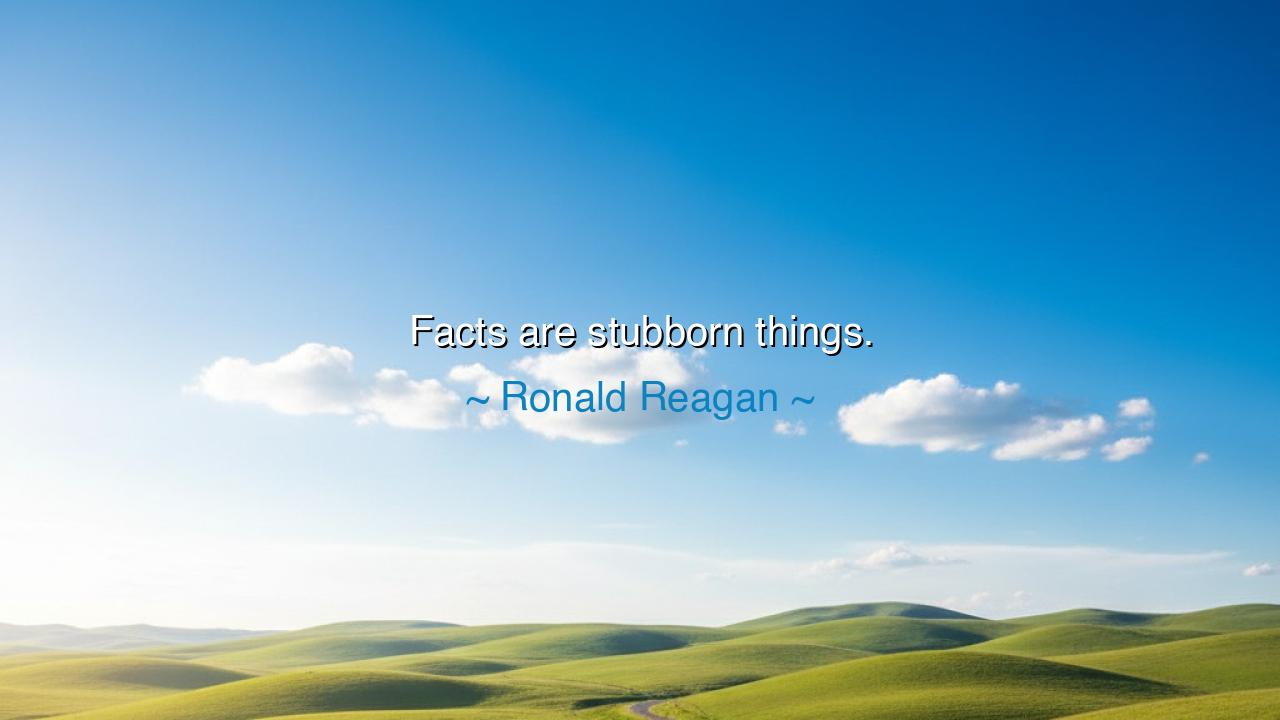
Facts are stubborn things.






Ronald Reagan once reminded the world with a phrase as sharp as steel: “Facts are stubborn things.” Though he spoke in the twentieth century, these words are far older, reaching back to John Adams, who used them in defense of justice during the Boston Massacre trials. The wisdom is timeless, for it proclaims that facts do not bend to will or desire, nor do they yield to passion, prejudice, or the dreams of men. They stand firm, immovable, and unyielding. They are like mountains—one may ignore them, deny them, or attempt to walk around them, but still they endure.
The meaning of this quote is both simple and profound. The human heart longs for comfort, and so it often twists reality to suit itself. People build illusions, they cling to lies, they hope to turn shadows into truth. Yet facts are not so easily tamed. They resist the hand of the deceiver. They stand like guards at the gate, declaring, “This is what is, whether you accept it or not.” They may be inconvenient, they may be painful, but they cannot be destroyed. In their stubbornness lies their power.
History gives us vivid examples. When John Adams defended British soldiers in 1770, the anger of the people cried out for blood. The crowd wanted vengeance, and the air was filled with fury. Yet Adams reminded them that facts are stubborn things—that the soldiers had acted under duress, that evidence mattered more than rage. His words saved innocent men from unjust punishment, and in doing so, he reminded a young nation that justice cannot be built on anger alone, but on truth. Thus, the stubbornness of facts preserved both fairness and honor.
We see this lesson also in science. For centuries, many clung to the belief that the sun circled the Earth. It was comfortable, it was simple, it pleased the powerful. But the facts—the movements of planets, the evidence of telescopes—remained stubborn. No decree, no threat, no denial could erase them. Eventually, truth prevailed, and human understanding leapt forward. The stubbornness of facts tore down the walls of ignorance and opened the heavens to the eyes of humankind.
Yet we must also see the paradox: though facts are stubborn, human beings are often more stubborn still. They turn away from truth, clinging to lies because they are easier to bear. But no matter how long falsehood is cherished, reality will not yield. The stubbornness of facts eventually breaks through, like sunlight piercing the clouds. To resist them is to wage war against reality itself—a war that no man has ever won.
The lesson is clear: build your life on truth, not illusion. Do not twist reality to fit your comfort, for reality will not twist for you. Face the facts, even when they wound your pride or challenge your desires. For only by embracing what is real can you rise above it, change it, or grow within it. To live in denial is to live in weakness; to live in truth is to live in strength.
Practically, this means cultivating honesty in your dealings, humility in your judgments, and courage in your acceptance of reality. When confronted with unwelcome facts, pause before denial. Ask yourself, “What is the truth here, and what must I learn from it?” In doing so, you turn the stubbornness of facts from a wall into a teacher, from an obstacle into a guide.
Thus, remember the words spoken across centuries: “Facts are stubborn things.” They will not change for you, but you can change through them. They are not the enemy, but the foundation upon which all wisdom and justice are built. Embrace them, and you will walk not in illusion, but in the unshakable strength of truth.






GDGold D.dragon
Reagan’s quote reminds us that facts can be unwavering, but what happens when those facts conflict with our emotions or beliefs? Are we able to accept facts even when they challenge our view of the world? And can we learn to embrace uncomfortable facts, knowing that they remain unchanged no matter how much we might wish they were different? How do we handle the stubbornness of facts in our personal and collective growth?
KTNguyen Thi Kim Thu
Reagan’s statement suggests that facts are resistant to change, but does that imply that they are always trustworthy? Are there times when facts are misrepresented or misunderstood, leading to confusion or misjudgment? How do we ensure that the ‘stubbornness’ of facts doesn’t get in the way of deeper understanding? Is there a point where the rigid adherence to facts can hinder growth or progress in certain situations?
PVPhong Vuba
The idea that ‘facts are stubborn things’ feels like a reminder that reality doesn’t bend to our desires or beliefs. However, I wonder—are facts always clear and indisputable? There are often different interpretations of the same facts, and sometimes, facts are selective or incomplete. How do we reconcile the idea of stubborn facts with the complexity of human experience, where perspectives can vary even in the face of seemingly irrefutable evidence?
NPNhi Pham
This quote is powerful because it highlights the unchanging nature of facts. But does this mean that facts, by themselves, always lead to clarity? Or do we sometimes struggle to see the truth behind the facts because of our biases or emotions? Can facts ever be used in ways that mislead, even if they remain 'stubborn'? How do we ensure we interpret facts correctly, without letting them be distorted?
TNtham nguyen
Reagan’s quote about facts being stubborn makes me think about how facts, no matter how uncomfortable or inconvenient, always remain the same. But can facts truly be objective, or do we sometimes manipulate them to suit our own perspectives? Does this mean that truth, even when stubborn, is absolute, or are there nuances that facts can't fully capture? How do we navigate the tension between fact and interpretation in our daily lives?